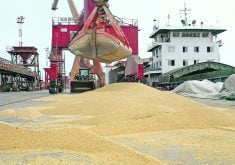Predictions that the world is heading into a deep recession in the wake of the Sept. 11 terrorist attacks on the United States seem overly pessimistic.
True, world economies were shaky before the attacks and since then airline and other travel-related industries have announced massive layoffs.
North American consumers stayed home in the weeks immediately after the attacks.
But there are signs consumers are returning to the shops and that a series of measures designed to stimulate the economies of the U.S., Canada and other countries will eventually take hold.
Read Also

Defence investments could benefit agriculture
A bump in Canada’s NATO spending commitments could lead to infrastructure investments that would benefit rural areas
Consumer spending has been particularly important this year. Business spending has been down all year in the wake of the high tech industry fizzle and generally lower profit margins.
But North American consumers had been busily buying houses, cars and gadgets, enough to keep the economy afloat.
A highly respected University of Michigan consumer sentiment survey released last week said the shock of the terrorist attacks was wearing off and people were returning to their lives.
And if they have a job, there is probably going to be more money in their pockets in the coming months.
Canada and the U.S. are already in the midst of huge income tax cuts announced last year. In Canada, it is a $100 billion, five-year tax reduction and in the U.S., it is a $1.3 trillion US, 10-year cut.
American president George W. Bush and Congress are now putting forward additional economic stimulant proposals, including more tax cuts, valued at as much as $100 billion.
Interest rates have been slashed to a 30-year low.
Gasoline and natural gas costs are well down from last year, saving Canadians an estimated $5 billion Cdn in the coming 12 months if the prices hold.
These factors should give consumers the ability to go out and spend. The question is whether they will be in the right mindset.
The anthrax threat was keeping people on edge early this week, but the media was also carrying the word that the danger for widespread damage from the disease is negligible.
It might seem hard to believe now, but soon people will become accustomed to living in more uncertain times. If they’ve saved for a house or a car, they’ll buy it. If they want to dine out, they will.
The economy may not boom, but neither will it bust.














